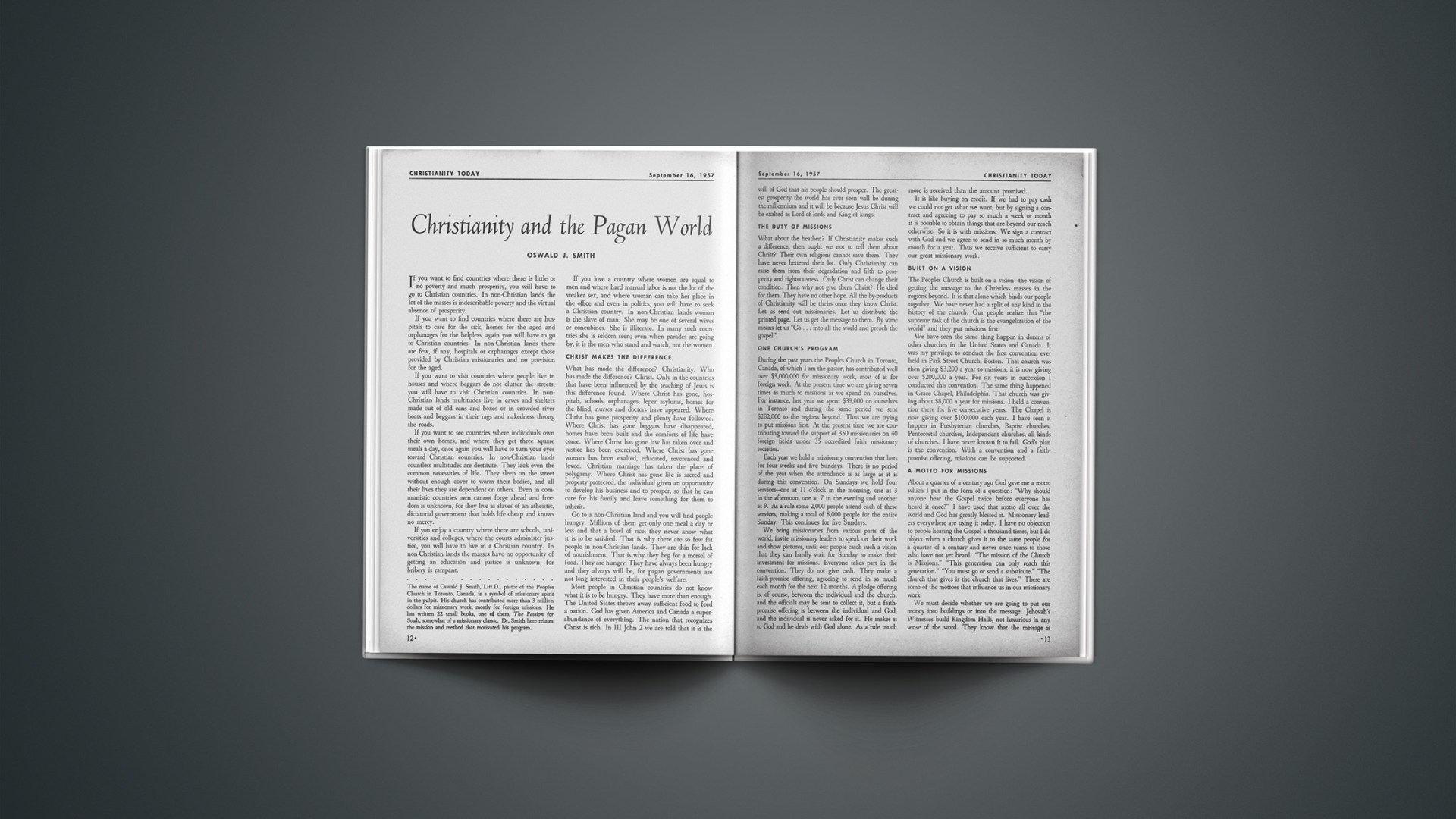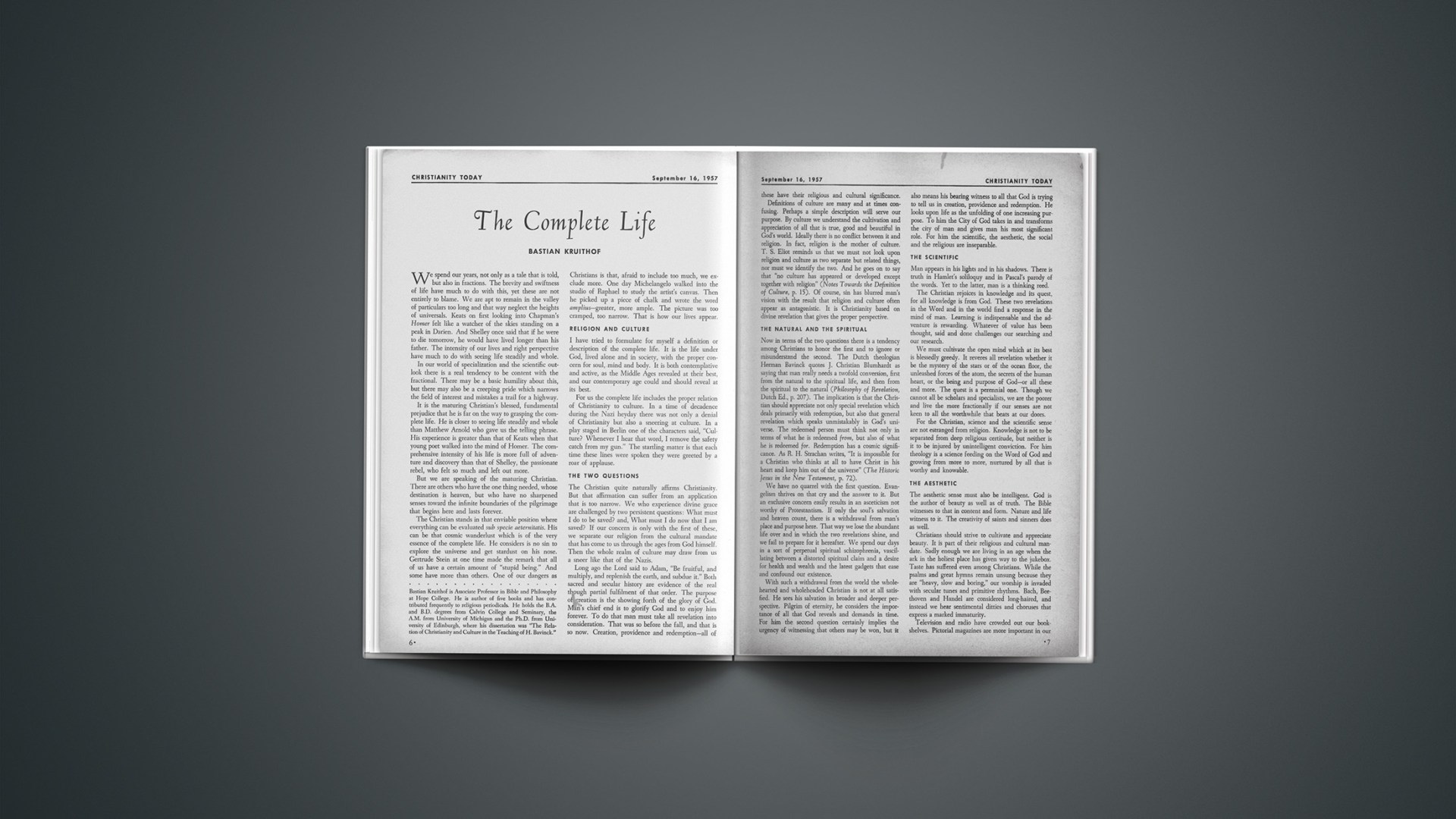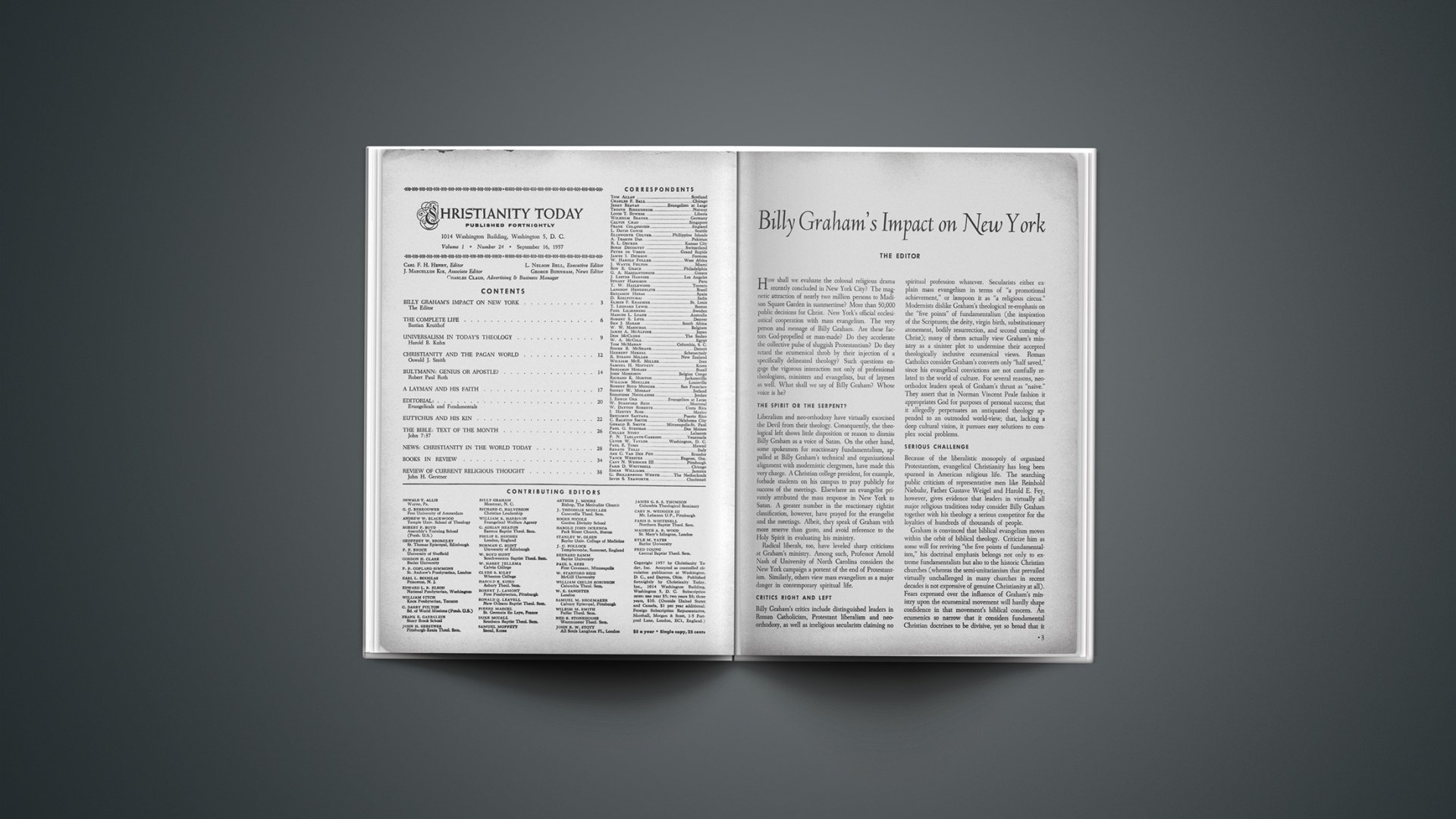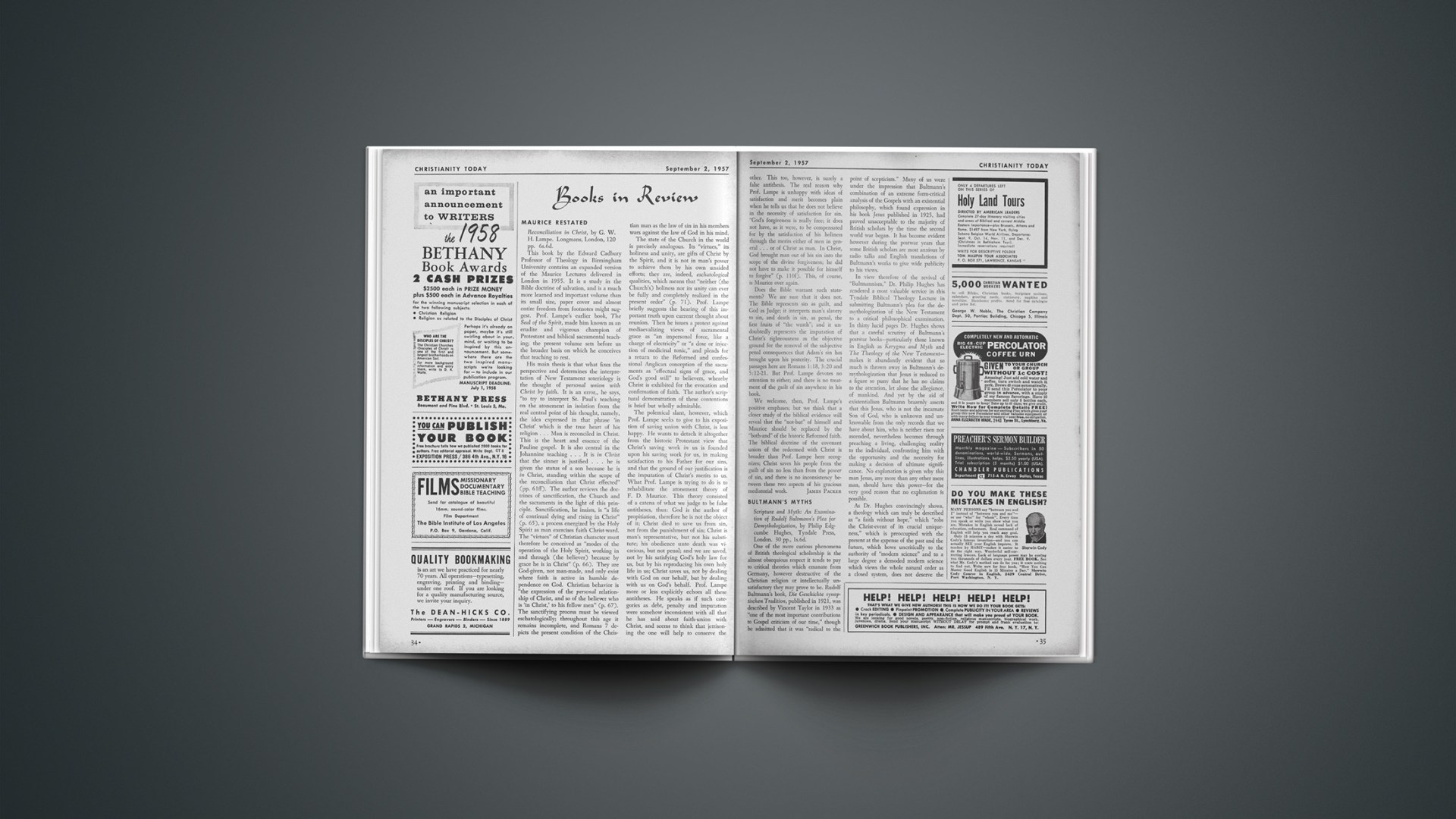If you want to find countries where there is little or no poverty and much prosperity, you will have to go to Christian countries. In non-Christian lands the lot of the masses is indescribable poverty and the virtual absence of prosperity.
If you want to find countries where there are hospitals to care for the sick, homes for the aged and orphanages for the helpless, again you will have to go to Christian countries. In non-Christian lands there are few, if any, hospitals or orphanages except those provided by Christian missionaries and no provision for the aged.
If you want to visit countries where people live in houses and where beggars do not clutter the streets, you will have to visit Christian countries. In non-Christian lands multitudes live in caves and shelters made out of old cans and boxes or in crowded river boats and beggars in their rags and nakedness throng the roads.
If you want to see countries where individuals own their own homes, and where they get three square meals a day, once again you will have to turn your eyes toward Christian countries. In non-Christian lands countless multitudes are destitute. They lack even the common necessities of life. They sleep on the street without enough cover to warm their bodies, and all their lives they are dependent on others. Even in communistic countries men cannot forge ahead and freedom is unknown, for they live as slaves of an atheistic, dictatorial government that holds life cheap and knows no mercy.
If you enjoy a country where there are schools, universities and colleges, where the courts administer justice, you will have to live in a Christian country. In non-Christian lands the masses have no opportunity of getting an education and justice is unknown, for bribery is rampant.
If you love a country where women are equal to men and where hard manual labor is not the lot of the weaker sex, and where woman can take her place in the office and even in politics, you will have to seek a Christian country. In non-Christian lands woman is the slave of man. She may be one of several wives or concubines. She is illiterate. In many such countries she is seldom seen; even when parades are going by, it is the men who stand and watch, not the women.
Christ Makes The Difference
What has made the difference? Christianity. Who has made the difference? Christ. Only in the countries that have been influenced by the teaching of Jesus is this difference found. Where Christ has gone, hospitals, schools, orphanages, leper asylums, homes for the blind, nurses and doctors have appeared. Where Christ has gone prosperity and plenty have followed. Where Christ has gone beggars have disappeared, homes have been built and the comforts of life have come. Where Christ has gone law has taken over and justice has been exercised. Where Christ has gone woman has been exalted, educated, reverenced and loved. Christian marriage has taken the place of polygamy. Where Christ has gone life is sacred and property protected, the individual given an opportunity to develop his business and to prosper, so that he can care for his family and leave something for them to inherit.
Go to a non-Christian land and you will find people hungry. Millions of them get only one meal a day or less and that a bowl of rice; they never know what it is to be satisfied. That is why there are so few fat people in non-Christian lands. They are thin for lack of nourishment. That is why they beg for a morsel of food. They are hungry. They have always been hungry and they always will be, for pagan governments are not long interested in their people’s welfare.
Most people in Christian countries do not know what it is to be hungry. They have more than enough. The United States throws away sufficient food to feed a nation. God has given America and Canada a superabundance of everything. The nation that recognizes Christ is rich. In 3 John 2 we are told that it is the will of God that his people should prosper. The greatest prosperity the world has ever seen will be during the millennium and it will be because Jesus Christ will be exalted as Lord of lords and King of kings.
The Duty Of Missions
What about the heathen? If Christianity makes such a difference, then ought we not to tell them about Christ? Their own religions cannot save them. They have never bettered their lot. Only Christianity can raise them from their degradation and filth to prosperity and righteousness. Only Christ can change their condition. Then why not give them Christ? He died for them. They have no other hope. All the by-products of Christianity will be theirs once they know Christ. Let us send out missionaries. Let us distribute the printed page. Let us get the message to them. By some means let us “Go … into all the world and preach the gospel.”
One Church’S Program
During the past years the Peoples Church in Toronto, Canada, of which I am the pastor, has contributed well over $3,000,000 for missionary work, most of it for foreign work. At the present time we are giving seven times as much to missions as we spend on ourselves. For instance, last year we spent $39,000 on ourselves in Toronto and during the same period we sent $282,000 to the regions beyond. Thus we are trying to put missions first. At the present time we are contributing toward the support of 350 missionaries on 40 foreign fields under 35 accredited faith missionary societies.
Each year we hold a missionary convention that lasts for four weeks and five Sundays. There is no period of the year when the attendance is as large as it is during this convention. On Sundays we hold four services—one at 11 o’clock in the morning, one at 3 in the afternoon, one at 7 in the evening and another at 9. As a rule some 2,000 people attend each of these services, making a total of 8,000 people for the entire Sunday. This continues for five Sundays.
We bring missionaries from various parts of the world, invite missionary leaders to speak on their work and show pictures, until our people catch such a vision that they can hardly wait for Sunday to make their investment for missions. Everyone takes part in the convention. They do not give cash. They make a faith-promise offering, agreeing to send in so much each month for the next 12 months. A pledge offering is, of course, between the individual and the church, and the officials may be sent to collect it, but a faith-promise offering is between the individual and God, and the individual is never asked for it. He makes it to God and he deals with God alone. As a rule much more is received than the amount promised.
It is like buying on credit. If we had to pay cash we could not get what we want, but by signing a contract and agreeing to pay so much a week or month it is possible to obtain things that are beyond our reach otherwise. So it is with missions. We sign a contract with God and we agree to send in so much month by month for a year. Thus we receive sufficient to carry our great missionary work.
Built On A Vision
The Peoples Church is built on a vision—the vision of getting the message to the Christless masses in the regions beyond. It is that alone which binds our people together. We have never had a split of any kind in the history of the church. Our people realize that “the supreme task of the church is the evangelization of the world” and they put missions first.
We have seen the same thing happen in dozens of other churches in the United States and Canada. It was my privilege to conduct the first convention ever held in Park Street Church, Boston. That church was then giving $3,200 a year to missions; it is now giving over $200,000 a year. For six years in succession I conducted this convention. The same thing happened in Grace Chapel, Philadelphia. That church was giving about $8,000 a year for missions. I held a convention there for five consecutive years. The Chapel is now giving over $100,000 each year. I have seen it happen in Presbyterian churches, Baptist churches, Pentecostal churches, Independent churches, all kinds of churches. I have never known it to fail. God’s plan is the convention. With a convention and a faith-promise offering, missions can be supported.
A Motto For Missions
About a quarter of a century ago God gave me a motto which I put in the form of a question: “Why should anyone hear the Gospel twice before everyone has heard it once?” I have used that motto all over the world and God has greatly blessed it. Missionary leaders everywhere are using it today. I have no objection to people hearing the Gospel a thousand times, but I do object when a church gives it to the same people for a quarter of a century and never once turns to those who have not yet heard. “The mission of the Church is Missions.” “This generation can only reach this generation.” “You must go or send a substitute.” “The church that gives is the church that lives.” These are some of the mottoes that influence us in our missionary work.
We must decide whether we are going to put our money into buildings or into the message. Jehovah’s Witnesses build Kingdom Halls, not luxurious in any sense of the word. They know that the message is more important than the building. They do not build a beautiful church and invite the people to come in; they put their money into the message, the printed page, and send it out. At one of their services they baptized 6,000 converts, every one of them won by the printed page. The communists are doing the same. They even boast that they took China by means of the printed page. The Church of Jesus Christ is going to have to change its methods. If we are going to depend upon missionaries, we are going to fail. The message is more important than the messenger.
Our people do not give as the world gives, namely, out of sympathy. We know that anyone will respond to physical needs. We have taught our people to give in order to carry out God’s program, which is to evangelize the unevangelized tribes of earth and thus bring back the King. Our policy is: “To hasten the return of our Lord by following his program for this age, which is to ‘preach the Gospel in all the world for a witness to all nations,’ and ‘to take out a people for his name.’ Our aim is to work among peoples, tribes and nations where Christ is not named.”
When Jesus left this world he left us one job and one only—world evangelization. Everything else is of secondary importance. We have no women’s missionary society in our church because we place the responsibility of missions upon everyone. It is only when the most important work of the church is given to everyone in the church that the church will indeed be a missionary church. I would never dream of giving the most important work of the church to any one of the many societies in the church. I give it to the entire church.
We have 130 elders. Last year our elders gave $42,000 to missions. No one becomes an official in the Peoples Church unless he is backing the great work of world evengelization and, if he ever ceases to back that work, he ceases to be an official. We have a choir of about 70 members. Last year our choir gave $10,000 to missions. We have a very small Sunday school, for we do not emphasize Sunday school work. There are less than 400 in it and yet our Sunday school gave $28,000 to missions last year. We have a small group of business girls, about 40 or 50, and they gave $5,000. Thus we have trained our people to put missions first. Any church can do the same.
There are still some 2,000 tribes without the Gospel, 2,000 languages into which no part of the Word of God has yet been translated. Jesus Christ cannot come to reign in millennial splendor, power, and glory until these tribes have been reached, for there must be some in the Body of Christ from every tribe, tongue and nation throughout the world. When, then, are we going to complete the task? When will we take him seriously? When will we invest more in missions than we invest at home? When will we put missions first? I have been preaching the Gospel now for 49 years, but I am a pastor second, a missionary first. I am a hymn writer and an author second, but a missionary first. I am an evangelist second, a missionary first. “The gospel must first be published among all nations.” God help us to accept the challenge and evangelize the world that the King may come back and reign.
END
George Stob is minister of Prospect Street Christian Reformed Church of Passaic, New Jersey, has been pastor in the state of Washington, chaplain in the U.S. Army during World War II and has taught Church History at Calvin Seminary, Grand Rapids. He is author of handbooks on Bible history and an editor of the monthly Reformed Journal.












